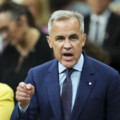While the circumstances were not of anyone’s choosing, the pandemic forced the accelerated modernization of the digital agenda across Canadian jurisdictions. As a result, Canadians now benefit from online government services that are more accessible, convenient, and increasingly more secure. And, while this modernization progressed more rapidly over the last 18 months, our reliance on, and expectations surrounding, digital government have also significantly increased.
With another federal election behind us, the Speech from the Throne is on its way and mandate letters will soon be issued to Cabinet ministers. This presents government with an opportunity to build on the momentum generated during the pandemic and incorporate lessons learned into its modernization agenda.
In a new Public Policy Forum report, Beyond the Digital Status Quo: Experiences and Lessons from the COVID-19 Pandemic, Canadian officials and digital experts weigh in on the lessons learned from the pandemic about digital transformation, remote work, and agile development. Here are some key takeaways.
Digital transformation is a journey
Cloud-based services have allowed a quick pivot to remote work while improving the speed of project scale-up and implementation. The urgency of the pandemic accelerated these transitions even further. As PPF’s report observes, “Organizations that had re-architected their systems using modern digital approaches, often cloud-based, were able to quickly modify existing services and deploy new ones.” In fact, according to the report’s authors, some organizations were able to change or develop services 20 to 40 times faster during the pandemic when compared to their usual performance.
Organizations wanting more technological agility should recognize that digital transformation is not a destination but a journey along a spectrum that moves from simple to complex. Using cloud-based services does not necessarily mean being digitally transformed. The transformation of business processes is not short, allowing change in not only how but also in what an organization does.
Acting is better than the digital status quo
The public service often hesitates to take on seemingly risky digital projects with unpredictable impacts. The pandemic forced the reality that not doing anything is the riskier option. For example, the Canada Emergency Response Benefit, while not a perfect platform, was better than the alternative of leaving millions of Canadians financially stranded. As the report states, “Organizations that successfully adapted to the pandemic correctly compared the risk of a proposed development to the risk, to business or society, of not doing the proposed development.” The authors conclude that the pandemic has forced organizations to adopt a more nuanced understanding of risk.
Technical debt weakens security and leaves organizations vulnerable
Canada’s public sector is bogged down by technical debt—spending money to maintain out-of-date devices, software, and legacy infrastructure instead of updating to new ones. Legacy systems are hard to repurpose and made it difficult for IT leaders to pivot projects early in the pandemic. Dated government systems pose a significant cybersecurity threat as this obsolete technology can no longer receive vital security updates.
At the beginning of the pandemic, public servants lacked access to critical digital resources. For example, the government could not provide enough digital licenses or bandwidth to support the sudden surge in demand for remote access, leaving employees with limited VPN access. With cybersecurity poised to remain a top government priority, it is essential to eliminate dependence on out-of-date systems, as well as processes that do not reflect the new realities of remote work and online collaboration.
Dated government systems pose a significant cybersecurity threat.
Digital modernization requires budgeting and procurement updates
How funding is obtained, managed, and structured in organizations can be an unintended disincentive to cloud-based service migration. PPF’s report notes that “the ‘all-in’ pricing of cloud makes the costs of maintaining data centers clearly visible, which should result in better-informed decision making.” However, when such costs are compared to the traditional model of infrastructure funding, where the total cost of ownership has not been factored in, cloud services may appear more expensive.
Navigating large-scale change requires adaptive leadership
Leaders who successfully guided their teams through the early pandemic challenges made quick, data-driven decisions. A flexible approach allowed leaders to reverse decisions and pivot plans based on evolving information. They used the concept of (irreversible) “one-way door” decisions and (reversible) “two-way door” decisions to evaluate risk. One-way door decisions required more scrutiny, but two-way door decisions could be implemented quickly. Successful leaders also took accountability for their team’s decisions and empowered employees to make decisions that were not “by the book.”
What now?
Will the public sector carry these lessons forward? The recent 2021-24 Digital Operations Strategic Plan called on the Canadian government to “build on the momentum” of changes made during the pandemic so that Canada can “actively prepare to respond to other disruptions that may lie ahead.”
The pandemic was a forcing function that proved the public sector can be nimble, creative, and courageous in response to a crisis. When the shift to pandemic recovery begins, there is an opportunity to build on these achievements and accelerate digital transformation even further by clearing away the blockers of technical debt and out-moded processes.
The COVID-19 pandemic is not the last crisis Canada will face in the coming decades. Future pandemics, disasters, and other high-impact events will continue to test organizational adaptability and resiliency. Governments that are digitally transformed will be better prepared for sudden, unforeseen change.
Recommended for You

The state of Canada’s economy halfway through 2025

Peter Menzies: It’s no wonder Canadians are tuning out the legacy media

The Notebook by Theo Argitis: Trump halts trade talks, Carney’s trade-offs and John McCallum’s legacy

Lydia Perovic: The future of history looks bleak, if Toronto’s museums are any indication



